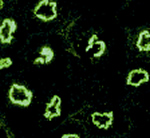Immunology, Virology and Molecular Pathogenesis
 Remarkable progress has been made in recent years in understanding the properties of infectious agents such as bacterial pathogens, viruses, and protozoa, which allow these organisms to cause disease. Equally important has been the definition of the immune system and how it responds to the presence of infectious agents. Researchers at the University of Virginia are interested in the mechanisms by which cells of the immune system recognize the presence of foreign substances or of virally infected cells and how the immune cells act to eliminate these invaders.
Remarkable progress has been made in recent years in understanding the properties of infectious agents such as bacterial pathogens, viruses, and protozoa, which allow these organisms to cause disease. Equally important has been the definition of the immune system and how it responds to the presence of infectious agents. Researchers at the University of Virginia are interested in the mechanisms by which cells of the immune system recognize the presence of foreign substances or of virally infected cells and how the immune cells act to eliminate these invaders.
Other researchers focus on the properties of infectious agents and study the structure and assembly of viruses, including RNA tumor viruses, the HIV agent associated with AIDS, and other RNA- and DNA-containing viruses that are of medical importance. Other groups study the surface properties of fungi and amoeba that allow them to cause disease. It is only by understanding both the character of the infectious agents and the nature of the body’s response to these that we will be able to conquer the particular disease.
Faculty

Agaisse, Herve
Genetic approaches, cellular and molecular biology of intracellular pathogen infection

Engelhard, Victor H.
Identification of MHC-restricted tumor antigens / Control of T cell homing to tumors / Tertiary lymphoid structures and intratumoral immunity

Guler, Jennifer
Mechanisms of Genetic and Metabolic Adaptation in the Malaria Parasite, Plasmodium falciparum

Hammarskjold, Marie-Louise
Post Transcriptional Gene Regulation and the Molecular Biology of Human Retroviruses

Perez-Reyes, Edward
Exploring epilepsy circuits then preventing seizures using gene therapies. Developing drug-inducible genetic switches for insulin replacement gene therapies.

Rekosh, David M.
Human Immunodeficiency Virus Gene Expression; Human Endogenous Viruses; SARS-CoV-2 Protein Trafficking; Post-transcriptional Gene Regulation

Tamm, Lukas K.
Biomembrane Structure and Function; Cell Entry of Enveloped Viruses; Neurosecretion by Exocytosis; Structure of Bacterial Pathogen Membrane Proteins; Lipid-Protein Interactions

Wu, Martin
Research: microbial evolution and ecology, microbial genomics, metagenomics, bioinformatics, phylogenomics, endosymbionts

Zimmer, Jochen
Transport of biopolymers across biological membranes with a particular interest in polysaccharide and protein translocation.







